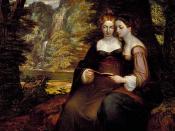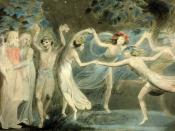'A Midsummer Night's Dream' was written by William Shakespeare in 1595 and performed to celebrate a wedding in a noble family. It was seen at the time as a light comedy and nothing more, but audiences and those studying the play have since discovered that the play is more dramatically complex than first thought. Shakespeare explores many different themes in 'A Midsummer Night's Dream', one of the main ones being love. The portrayal of love in the play has been described in different forms; it can be described as a sickness or madness, in the way that it causes people to behave irrationally and to do things that they wouldn't normally. For instance, Hermia disobeying her father when she knows that the punishment would be terrible seems like madness. It has also been thought that Shakespeare had wanted to mock love, and make it seem like a foolish game.
There are many examples of this in the play, which I will look at in this essay.
The play opens as a wedding is supposed to take place, which people see as a holy union between two people in love. However, that union is interrupted by a request from outside, as Egeus arrives to protest against his daughter Hermia, saying: "Come I, with complaint/against my child", because she refuses to marry the man he chose. The fact that this symbol of love and devotion, a wedding, begins the play, but never actually takes place initiates the exemplification of the foolishness of love for the rest of the drama. Whether he intended to or not, Shakespeare appears to ridicule love, as he seems to epitomize how foolish it is throughout the play.
Titania and Oberon, the Fairy Queen and King, enter in Act 2 Scene 1, enraged with one another...



Comment
Your intro doesn't open the paper up very well. There wasn't much of a thesis statement, and I thought that the "...I will look at in the essay" was a bit abrupt.
Your conclusion leaves the reader trying to decide what your final answer is. You say yes you agree with the statement, but then you contradict yourself. In the body of the paper you do that as well.
Make sure to pick one answer and stick with it. The reader gets lost in translation if you switch sides or ride the fence post on an answer.
0 out of 0 people found this comment useful.